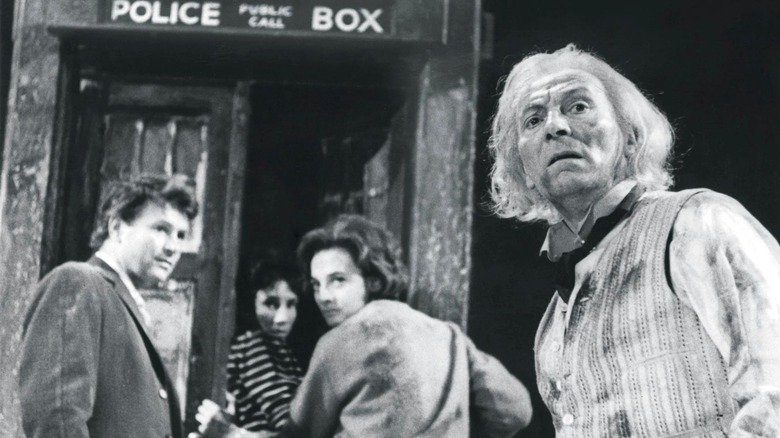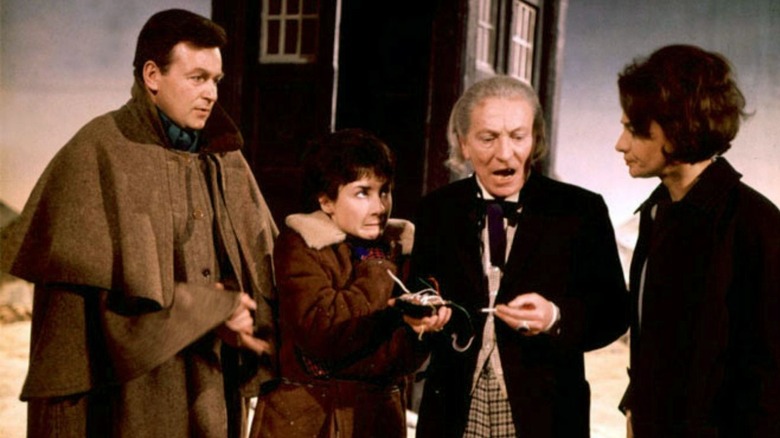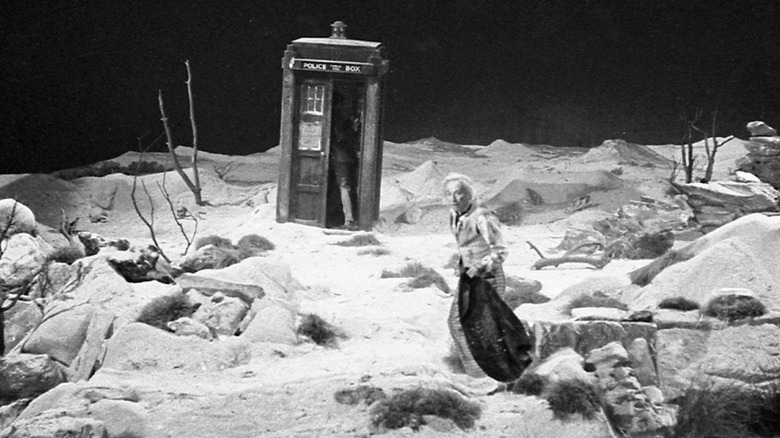Doctor Who Could Have Been A Much Darker Sci-Fi Show
The "Doctor Who" 2005 reboot revitalized the sci-fi series, instilling modern audiences with a love for the legendary time traveler and his many adventures. But when the original series arrived on the BBC in 1963, it was a phenomenon unlike anything seen on television before. William Hartnell was the first actor to introduce the quirks and idiosyncrasies we've come to associate with the Doctor; he might have appeared as a frail, older man, but in reality, the First Doctor was more than capable — he played dangerous games with the Celestial Toymaker, persuaded a Roman emperor to burn down his own city, and gave the Daleks a run for their money.
Not much is known about the show's early run because the BBC lost several "Doctor Who" episodes over the years; what we do know is that the sci-fi series wasn't always going to be a fun time-traveling adventure. It was going to get dark ... like really, really dark.
The Doctor was a "senile, old man"
"Doctor Who" was first conceived as an educational family program with teachers as protagonists who would narrate stories based on historical events. It was one of the many original ideas that were eventually put on the back-burner, but not the worst one of them all. The Doctor wasn't always written as a charming time lord with a penchant for adventures and a knack for defying aliens. The opening story saw him as an old man wandering in a foggy street, an "amnesiac" who didn't remember his name.
After writer and playwright C.E. Webber presented his "Doctor Who" pitch, featuring adults who were "experts" and a secretive, fourth man, Canadian producer Sydney Newman (who played a pioneering role in British television at the time) decided he wanted Webber's undeveloped, mysterious character to play the most prominent part in the show.
Newman reworked the extensive cast of characters, eliminating Webber's description (via Doctor Who: A History by Alan Kistler) for the "experts," so the series could incorporate dialogue that explained the show's science fiction-based plot in a speech accessible to children. Newman then developed the show's characters, likening them to "ordinary people to whom extraordinary things happen." The group included Biddy, a 15-year-old girl; Lola, a 24-year-old mistress at Biddy's school; and, Cliff, a master at the school. The mysterious fourth character was called "Dr. Who" and was "a senile old man" and an alien scientist between 720 to 760 years of age.
Newman continued developing Dr. Who as a mature character who had escaped a faraway planet in a spaceship he didn't know how to operate. The spaceship in question was also a time machine that the characters would use for their adventures. The concept that the ship would be "bigger on the inside" was suggested by Newman!
C.E. Webber penned a new pitch
A new pitch from C.E. Webber explained that Dr. Who was an experienced time-traveler who had been the inspiration of "many myths and fairy tales on Earth." The character was at the show's center, searching for something he could not describe. He was also "capable of sudden malignance" and possessed a hatred for scientists and inventors — he endeavored to "stop progress (the future) wherever he finds it while searching for his ideal (the past)."
Sydney Newman wasn't a fan of the idea — he didn't want the Doctor to be so conservative. A hand-written note from Newman critiquing the character's development reads: "Don't like this at all. Dr. Who will become a kind of father figure — I don't want him to be a reactionary."
The program's pitch was altered repeatedly — every new version slowly formed the Doctor into the character we know him today. Newman — along with Donald Wilson, C.E. Webber, writer Anthony Coburn, editor David Whitaker, and producer Verity Lambert, heavily contributed to the sci-fi show's development during its early stages. Their efforts paved the way for "Doctor Who" to transform into the phenomenon it became while setting up a fanbase that dedicatedly watches the show's reboot even 50 years after it was first released. Who knows how dark "Doctor Who" would have been if it wasn't for their input!


